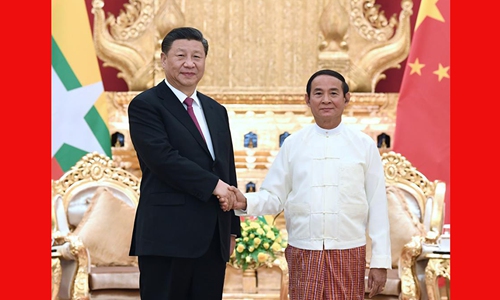This week, Chinese president Xi Jinping and Myanmar president U Win Myint exchanged congratulatory messages on the 70th anniversary of diplomatic relations between their countries. Each celebrated a long history of political and economic cooperation, marked most recently by combined efforts to contain the spread of COVID-19. The messages come six months after Xi travelled to Myanmar for the first visit by a Chinese head of state in almost 20 years.
That visit ended in dozens of new trade deals and marked a high point for Myanmar’s deepening ties to its largest neighbor. As internal conflicts and political scandals have damaged Myanmar’s global reputation (and the reputation of Daw Aung San Suu Kyi), China has forged ahead with billions of dollars in trade, infrastructure developments, and partnerships in mining, energy and power. Many of these fall under the China-Myanmar Economic Corridor, a vast initiative that calls for new railways, highways, power plants and special industrial zones in Myanmar’s north. Likewise, the 771-kilometer Myanmar-China Oil and Gas Pipelines have provided China with direct access to the Bay of Bengal and a lucrative client for Myanmar’s growing fossil fuel industry. China also attempted to broker peace between the Myanmar government and Northern Alliance armed groups when fighting began to disrupt border trade last year.
However, the intersection between economics, politics and conflict has been a major point of concern for activists and watchdogs who claim China is gaining dangerous economic hegemony over its smaller, weaker neighbor. Critics point to other Chinese-backed projects they claim lack transparency and harm local communities. Perhaps the most notorious example is the Myitsone Dam, a Chinese-backed hydroelectric project that has been stalled for years due to outcry over possible environmental damage. In Sagaing Region, the Chinese-owned Letpadaung Copper Mine has been mired in accusations of poisoning the local water with industrial waste. In April of this year, the United States Institute of Peace published a lengthy expose of alleged Chinese business ties to armed groups in Kayin State. As Myanmar recognizes 70 years of relations, it must convince the world and its own people that it can do responsible, regulated and transparent business with its most powerful neighbor.


